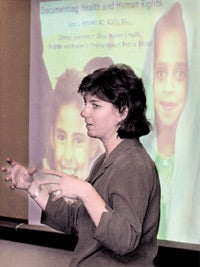Amowitz looking to improve the world, one day at a time
Lynn Lieberman Amowitz remembers trying to give her winter coat to another child in sixth grade. “I perceived the child as poor, and I kept giving the kid my coat. I’ve always have had the need to help,” she said recently at the Brody School of Medicine at East Carolina University.
Amowitz was on campus to deliver a Perspectives of Medicine lecture, “Wind, Sand, and Flies” at the medical school Nov. 7 and to be recognized the next day as one of ECU’s outstanding alumni.
She said the alumni award was “a huge surprise. I was in Iraq when I heard.”

ECU medical graduate Lynn Amowitz spoke about her work in Iraq with Physicians for Human Rights during a lecture Nov. 7 at the Brody School of Medicine.
That’s suitable. Amowitz is the senior medical researcher with Physicians for Human Rights. The 1992 graduate of the Brody School of Medicine also holds a faculty appointment at the Brigham and Women’s Hospital, a Harvard University hospital, in Boston.
She is also the daughter of Dr. Edward Lieberman, ECU professor of physiology.
During her lecture at the medical school, Amowitz described her work for PHR in Iraq in 2003 and in previous years in Afghanistan, Kosovo, Pakistan, Sierra Leone and Nigeria to document the health consequences of a wide range of human rights violations.
“Physicians for Human Rights has a strict policy of impartiality. We use medical and forensic sciences and tenets of international human rights,” she said. The organization, founded in 1986 in Boston, mobilizes the health professions to promote health by protecting human rights.
Since March, PHR has had an ongoing presence in Iraq, and Amowitz was part of that project for four months.
Amowitz found dire circumstances regarding women’s health care when she entered Iraq earlier this year as the American-led troops pushed northward. She worked in Iraq before, during and after the end of major combat.
“As the troops went up, we went with them. We camped in the desert or with the military,” Amowitz said. “We decided at this time to pair up with the military at night, which is unusual for a human rights group.”
In Iraq, 262 mass graves were found. “You can’t do DNA on 300,000 missing people,” she said.
“PHR decided to go into southern Iraq since not much was known about that region. We looked at human rights abuse since 1991 and women’s health issues,” she said.
A survey of 2,276 households conducted by Amowitz, her team and local trained data collectors in June and July found that people living in southern Iraq experienced widespread human rights abuses under Saddam Hussein’s Ba’ath regime from 1991 to April 2003. They also found strong support for the protection of human rights and overwhelming support for a process of justice to hold the perpetrators accountable.
According to PHR, heads of household were questioned about human rights abuses that occurred among household members, about women’s health and human rights, and about the issue of accountability for past abuses. A wealth of human rights data emerged, including the finding that 47 percent of households surveyed reported one or more human rights abuses in the period since 1991. Abuses included torture, killings, forced conscription, gunshot wounds, kidnappings, ear amputation, landmine injuries, sexual assault and hostage taking.
“Some Iraqis thought that the U.S. would come in and the next day the electricity would be back on. Electricity hasn’t been adequate there in 35 years,” Amowitz said.
She added that as pressure from the outside increases, PHR sees abuses in the country increase. “This was seen in Iraq as the U.S. turned up the pressure,” she said.
As she goes into areas, she meets with the local leaders. “In Afghanistan, I meet with the Taliban and its local leaders. You have to go and get their views as well. I have the headscarf or local dress, and I wear that. They might not have agreed but they didn’t stop me.